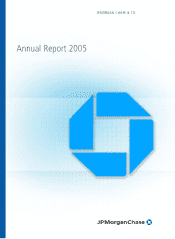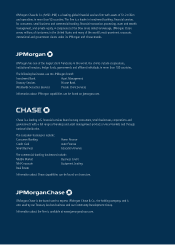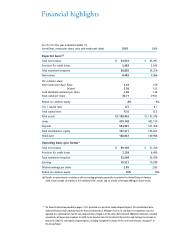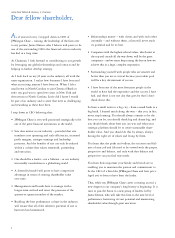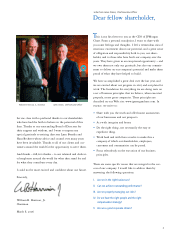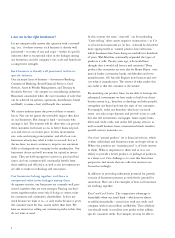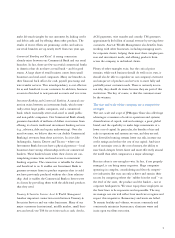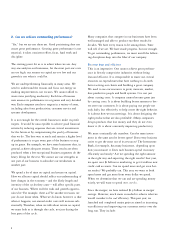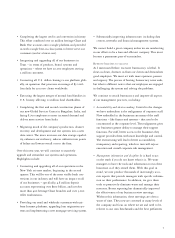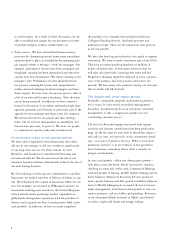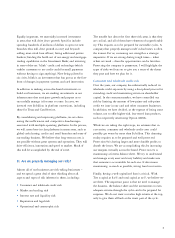JP Morgan Chase 2005 Annual Report Download - page 8
Download and view the complete annual report
Please find page 8 of the 2005 JP Morgan Chase annual report below. You can navigate through the pages in the report by either clicking on the pages listed below, or by using the keyword search tool below to find specific information within the annual report.
6
II. Can we achieve outstanding performance?
“Yes,” but we are not there yet. Good positioning does not
assure great performance. Creating great performance is not
mystical; it takes consistent effort, focus, hard work and
discipline.
The starting point for us is to admit where we are. Any
way one analyzes our businesses, for the most part our costs
are too high, our returns on capital are too low and our
growth is not what it could be.
We are underperforming financially in many areas. We
need to understand the reasons and focus our energy on
making improvements, not excuses. We cannot afford to
waste time justifying mediocrity. Each line of business
now assesses its performance in a rigorous and very detailed
way. Each compares results to targets in a variety of areas,
including sales force productivity, customer service and
systems development.
It is not enough for the overall business to make its profit
targets. It would be unacceptable to achieve good financial
returns by reducing expenses that are critical investments
for the future or by compromising the quality of business
that we do. The best way to reach and sustain a higher level
of performance is to get every part of the business to step
up its game. For example, we have some businesses that, in
general, achieve adequate returns. These results are often
produced when a few exceptional business segments do the
heavy lifting for the rest. We cannot use our strengths in
one part of our business to subsidize our weaknesses in
another part.
We spend a lot of time on capital and return on capital.
How we allocate capital should reflect our understanding of
how changes in the economy – and the likely length and
intensity of the cycles they cause – will affect specific parts
of our business. Where will the risks and growth opportu-
nities be? For example, there will be another recession; we
just do not know when. What we do know,however,is that
when it happens, our annual credit costs will increase sub-
stantially.Therefore, when we talk about return on capital,
we must look at it through the cycle, not just during the
best parts of the cycle.
Many companies that compete in our businesses have been
well managed and able to produce excellent results for
decades. We have every reason to be among them. Time
will tell if we are. We have made progress, but not enough.
To get outstanding performance, we must instill the follow-
ing disciplines deep into the fiber of our company.
Become lean and efficient
This is an imperative. One cannot achieve great perform-
ance in fiercely competitive industries without being
lean and efficient. It is irresponsible to waste our critical
resources on expenditures that have nothing to do with
better serving our clients and building a great company.
Weneed to use our resources to grow,innovate, market,
hire productive people and build systems. It is not just
about cutting costs. A company cannot become great just
by cutting costs. It is about building better systems to bet-
ter serve our customers. It is about paying our people not
only fairly,but effectively,to help create the right behavior.
It is about how we run meetings. It is about designing the
right products that are also profitable. (Many companies
design products that lose money,and they do not even
know it.) It is about constantly improving productivity.
We must continually ask ourselves: Can the same invest-
ment in the same area be better spent? Does every business
strive to get the most out of its resources? The Investment
Bank, for example, has many businesses, depending upon
how you measure it. Does each business spend its money
efficiently and wisely? Are we spending the right amount
in the right way and expecting the right results? Last year,
we spent over $billion in marketing to get million new
credit card accounts. Can we spend more and get even bet-
ter results? We probably can. This year, we want to both
spend more and get more from every dollar we spend.
When we determine that we can and are spending money
wisely, we will want to spend more, not less.
Since the merger, we have realized $.billion in merger
savings. However, much more is needed to achieve what we
would consider to be real efficiency. This past year, we
launched and completed major projects aimed at increasing
our efficiency and improving our customer service over the
long run. They include:

